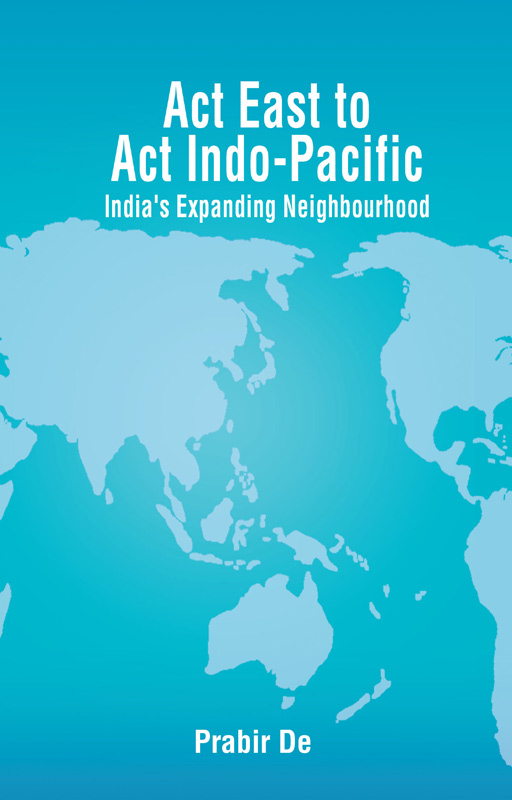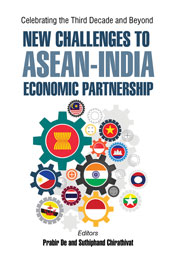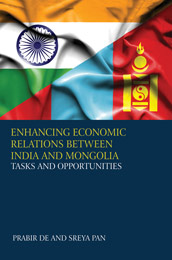India is known as a leading voice in international affairs. India’s economic size, vast and growing market, democratic institutions, access to ocean and foundation of science largely explain why India continues to play an important role in global and regional affairs. India is the only country in Asia having the heft to counterbalance China and thus welcomed by many countries in Asia and the Pacific. India has embarked on a period of radical changes in its foreign and economic policies. Faced with a major slowdown of India’s trade with Southeast and East Asia in 2014-15, the government responded by initiating far-reaching Act East Policy (AEP) aimed at greater economic integration with South, Southeast and East Asian nations. Started with a fresh vigour in 2014, AEP has gained a new momentum while acting on the east. The Act ‘East’ is now getting transformed into Act ‘Indo-Pacific’. This book presents short essays written by the author on several key aspects of India’s economic relations and the challenges faced by India in the post-AEP period. Ten broad themes are analysed in this book: BBIN, BIMSTEC, SAARC, ASEAN, MGC, Act East–North East, BCIM, BRI, Act Far East and Indo-Pacific. This volume highlights what, in author’s best judgement, should be the direction for India’s expanding neighbourhood. It is an economist’s insight and field experience based analysis that offers guidelines for international cooperation. This volume is an invaluable companion for the policymakers, academia, students of international relations, diplomats and the general readership as well.
Prabir De
Prabir De is a Professor at the Research and Information System for Developing Countries (RIS), New Delhi, and also Head of the ASEAN-India Centre (AIC), RIS. He works in the field of international economics and has research interests in international trade and development. He was a Visiting Fellow of the Institute of Developing Economies (IDE-JETRO), Japan; Asian Development Bank Institute (ADBI), Tokyo; and Visiting Senior Fellow of United Nations Economic and Social Commission for Asia and the Pacific (UNESCAP), Bangkok. He has been conducting policy research for the Government of India and several national and international organisations. He has a Ph.D. in Economics from the Jadavpur University, Kolkata. He has contributed several research papers in international journals and written books on trade and development. His recent books include Twenty Years of BIMSTEC: Promoting Regional Cooperation and Integration in the Bay of Bengal Region (Knowledge World, 2018); Celebrating the Third Decade and Beyond: New Challenges to ASEAN–India Economic Partnership (Routledge, 2018); Myanmar’s Integration with the World: Challenges and Policy Options (Palgrave Macmillan, 2017), etc. His research papers were published in several peer-reviewed journals such as Journal of Economic Integration, Journal of Asian Economics, Contemporary South Asia, Journal of International Logistics and Trade, Maritime Economics & Logistics, Transportation Quarterly, Maritime Policy and Management, International Journal of Maritime Economics, Economic and Political Weekly, Journal of Contemporary Asia-Pacific Studies, The Journal of the Korean Economy, Journal of Integration and Trade, Asian Development Review, Northeast Asian Economic Review, Foreign Trade Review, etc. He is also Editor of South Asia Economic Journal and the Founding Editor of the Journal of Asian Economic Integration, both published by Sage.
Contents
Foreword
Preface
List of Abbreviations
Introduction
BBIN
1. South Asian Countries Building Connections
2. Neighbourhood First: Connecting Nations
3. BBIN: From Transit to Economic Corridors
4. BBIN’s Trade Facilitation Challenges
5. Trade Facilitation Priorities of Landlocked Countries in BBIN
6. Deepening Regional Integration: BBIN Motor Vehicle Agreement
7. Facilitating Cross-Border Paperless Trade in BBIN
8. Setting up the BBIN Secretariat
BIMSTEC
9. BIMSTEC Must Scale New Heights
10. Big Ideas to Shape BIMSTEC’s Future
11. Jump Start BIMSTEC: Expectations from Fourth BIMSTEC Summit
12. Strengthening BIMSTEC Integration: The New Agenda
13. Ways to Strengthen Cooperation between BIMSTEC and IORA
SAARC
14. South Asia Connectivity 2.0
15. SDGs through Trade Facilitation in South Asia
ASEAN
16. 25 Years of ASEAN–India Integration
17. Indo-ASEAN New Model for Regional Cooperation
18. Shared Values, Common Destiny: What We Expect from the 16th ASEAN–India Summit
19. Strengthening Regional Value Chains between ASEAN and India
20. Emerging Contour of ASEAN–India Maritime Cooperation
21. Securing Sustainable Energy between India and ASEAN
MGC
22. Mekong-Ganga Cooperation: Connecting India with CLMVT
23. MGC-ACMECS Linkages
24. Harnessing Border Economic Zones for Border Connectivity in India’s Northeast
Act East–North East
25. Can ‘Act East’ Address Northeast India’s Isolation?
26. Act East–North East: Unlocking the Potentials
27. Act East–North East: Making Connectivity Work for Northeast India
28. Act East–North East: Border of Hope to Gateway to Southeast Asia
29. Making Northeast the Medical Tourism Hub for the Region
30. How the Government Can Help Northeast India Recapture Its Past Glory?
BCIM
31. BCIM Economic Corridor and North East India
32. Realising BCIM: Trade and Trade Facilitation Measures
BRI
33. Building a Better Belt and Road
34. Building an Inclusive BRI Amid Challenges
Act Far East
35. Act Far East: Strengthening India-Mongolia Partnership
36. Act Far East: Strengthening India-Russia Partnership
Indo-Pacific
37. Delhi Dialogue: Driving Indo-Pacific
38. Reshaping the Indo-Pacific Cooperation
39. Navigating the Indo-Pacific Cooperation
40. Act East to Act Indo-Pacific
Endnotes
References


 Political Science
Political Science


